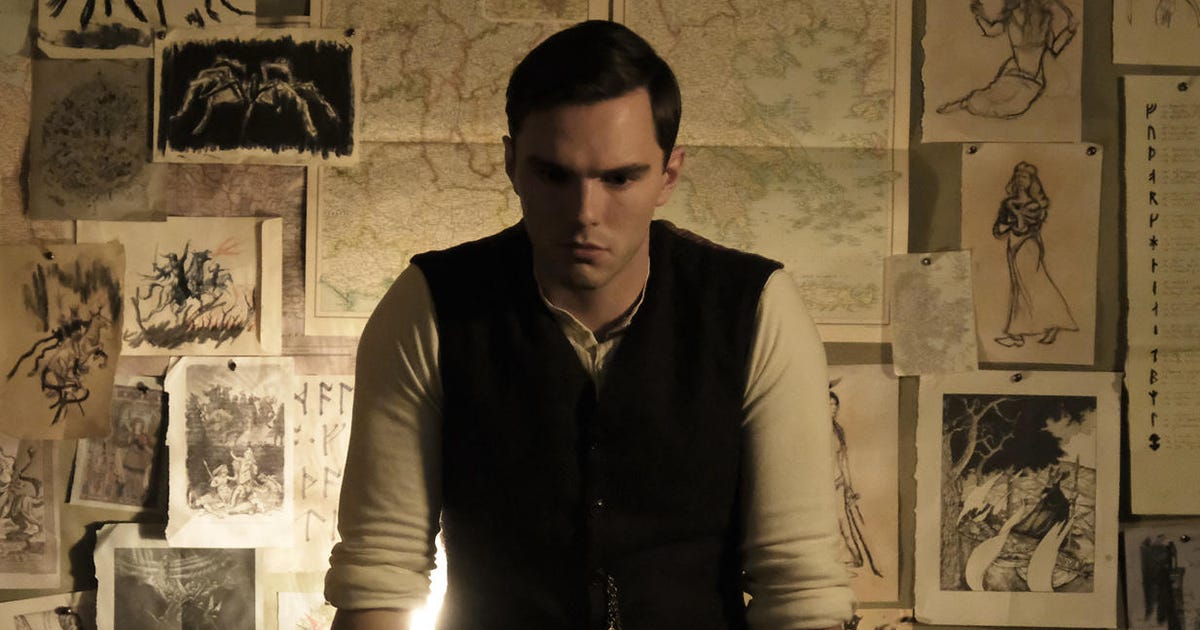
It’s pronounced Tol-keen, apparently.
Maybe you’re enough of a fan to already know how to say the Lord of the Rings author’s name. Maybe you saw the Peter Jackson movies or the new Prime Video series The Rings of Power. Maybe you’re not a fantasy fan at all. Either way, this biographical movie about the life of J.R.R. Tolkien is still a poignant tale of fellowship and a reminder of the humanity and creativity lost to war.
Originally released in 2019, Tolkien is available to rent or buy now.
Mad Max, X-Men and The Great star Nicholas Hoult takes the lead role as the legendary author. Tolkien was born in South Africa at the dawn of the 20th century, orphaned in England and instilled with a love of language at Oxford. In the movie, his life and his love for his wife, Edith, played by Lily Collins, are framed in flashbacks from the mud-clogged trenches of the First World War, where Tolkien served as an officer.
Directed by Dome Karukoski, the biopic illustrates various influences on The Hobbit and The Lord of the Rings. These include the epic myths read to young Tolkien by his late mother; Wagner’s Ring Cycle opera; and his transition from idyllic rural English shires to the hellish chimney towers of industrial Birmingham. The film is then tied together by Tolkien’s feverish hallucinations of fiery dragons and nightmarish knight-monsters stalking the gas-shrouded, flame-engulfed hellscape of the Western Front.
Some of these mirrorings are a bit dead-on: For example, Craig Roberts has a thankless task as a faithful companion named Sam, spurring Tolkien on an arduous quest through the trenches.
But really the Lord of the Rings allusions are just the hook to draw you into a bigger story. Fans will enjoy spotting the references to and inspirations for the Middle-earth books, but the real story is about a generation scythed down by war. At the upscale school where he feels like an outsider, Tolkien falls in with a group of artistic dreamers who find themselves in uniform while still only boys. Already confined by the strictures of society, they find themselves fighting for their lives during World War I.

Nicholas Hoult and Lily Collins face the nightmare of the First World War in Tolkien.
Fox
Tolkien symbolizes the artists, poets and painters, the creative, playful and gentle souls lost to war even if they made it home. The film presents Tolkien as a survivor who speaks for a generation of artists lost to history.
While it’s a heartfelt meditation on loss and linguistics, Tolkien’s actual life story is fairly slight — especially if you’re not keen on posh boys palling around posh schools. But there are gently affecting moments, like Edith pushing Tolkien beyond linguistics and into emotion by inventing a story on the spot. There’s also a heady cameo from Derek Jacobi, who delivers a stirring speech on the power of words.
Farewell to Middle-earth: celebrate ‘The Lord of the Rings’ and ‘The Hobbit’ (pictures)
But one doesn’t simply make a biopic without bending the truth a little. The Tolkien family has disavowed the film, and there are inevitably some deviations from the truth. The film implies Tolkien and his friends went straight to war, for example, though in reality he delayed joining up long enough for it to raise eyebrows. And it feels like the film may be playing coy with some aspects of Tolkien’s story. Director Dome Karukoski has made a couple of films based on true stories, and speaking to CNET he admitted biopics are “always a battle between fact and fiction.” But even if the facts are streamlined or adjusted, it’s only to find the “emotional truth” of the story.
Tolkien himself also resisted attempts to analyze the influences on his work. But Lord of the Rings remains as influential as ever, with Peter Jackson’s epic movie now followed by a hugely expensive new TV version on Amazon. And of course Tolkien’s influence is seen throughout the fantasy genre, from the Narnia stories of his contemporary C.S. Lewis to the phenomenon of George R.R. Martin’s Game of Thrones (and spinoff House of the Dragon).
Not just for Lord of the Rings fans, Tolkien (the movie) explores how the war to end all wars inspired one ring to rule all fantasy. And by taking Tolkien as a representative of a doomed generation, it reminds us of the tragedy that some things that shouldn’t have been forgotten were lost.
